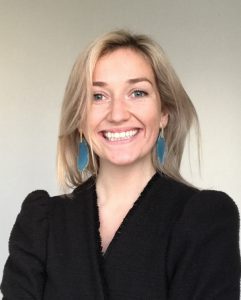
Getting children moving, and the barriers that prevent them doing so, has been the focus of Mairead Ryan’s time at Darwin. Her PhD in Medical Sciences, which she began in 2019 and with which she graduates this weekend, explores levels of physical activity among young people, and how different school-level factors can increase or decrease it.
“Child and adolescent health is a key concern in countries worldwide, and schools are popular settings to intervene, because you can access many young people in a single setting on a regular basis and over several years, so they are quite unique in that sense,” she explains.
“The PhD was looking at what kinds of school-based approaches are more effective than others in helping children and adolescents to move more and sit less.”
One element, which gained international press coverage when it was made public earlier this year, explored the role of school uniforms. Mairead found that when children are expected to wear a uniform, it is linked with a significant reduction in their physical activity, particularly in the case of primary aged girls.
“Other parts of the PhD examined factors like teacher professional development, policy implementation challenges, and school playground design – what do students play with at break-time? Is that linked with how active they are? And does that vary by gender?”
Mairead’s academic career began with her undergraduate degree in Psychology at Trinity College, Dublin. She then completed a Masters in Health Psychology at UCL, where she continued to work in cancer research before coming to Cambridge.
During her PhD Mairead was attached to the Faculty of Education on Hills Road and the Medical Research Council Epidemiology Unit at Addenbrooke’s Hospital.
“Lots of people started at the same time, so it felt like there was a friendly community there from the beginning. We all learned from each other and bonded over systematic reviews. I had a lot of support from postdocs and senior researchers too. It was fun – I really enjoyed it.”
Her research has demonstrated the wealth of material available on children’s health, reflecting school studies completed throughout the world, but much of which is buried in academic journals, unseen by the staff and policy-makers who could put its findings into action.
Mairead is now set on fixing this problem. In collaboration with the Centre for Global Equality, Cambridge Enterprise, and the Judge Business School, she is working on bringing more evidence into schools – beginning with translating the findings from long academic health reports into bite-sized, accessible research briefs.
Mairead’s research will be familiar to Darwinians who attended her Lunchtime Research Seminar last year, a format which she praises as reflective of Darwin’s friendly, approachable identity.
“It’s nice that you can learn about all these different areas of research, get a sense of what evidence exists, and see where the excitement is across a range of fields. I always found Darwin seminars and lectures to be jargon-free. That’s great. Great for hearing new perspectives and great for starting new conversations.”
